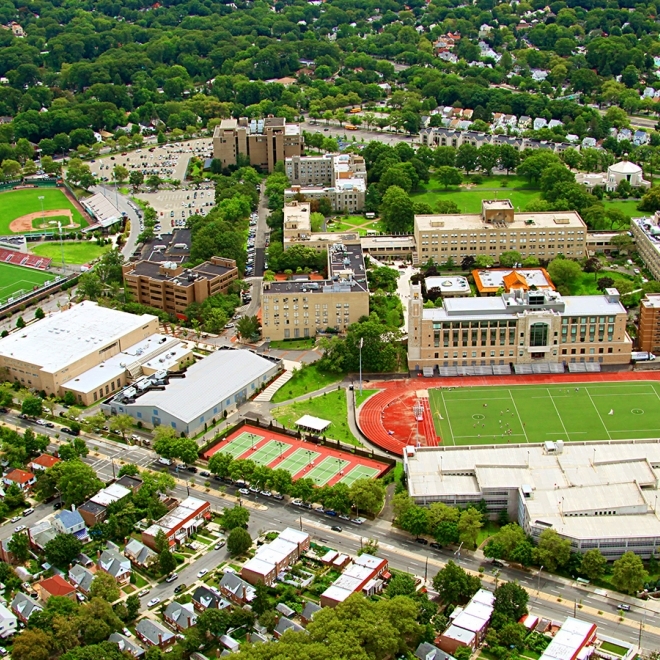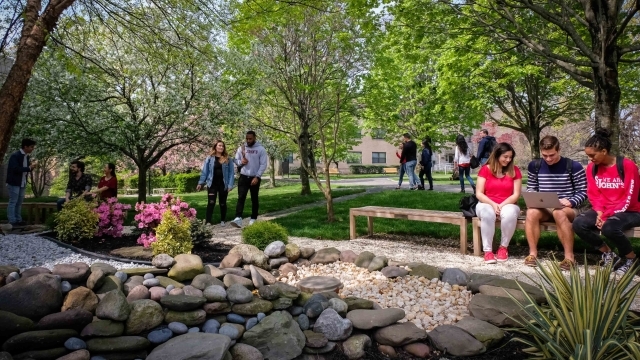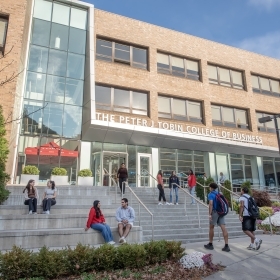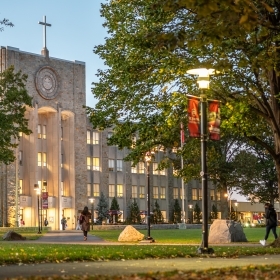Deciding between Colleges: 7 Key Factors besides Academics

You are at a crossroads of possibilities, surrounded by a stack of college brochures and admission letters. Each college or university represents a unique opportunity and a different path. How do you choose the one that’s right for you? It’s not just about the academic program a college or university offers. That is why we have created a list of seven key factors to consider when deciding between colleges.
1) Campus Size
The campus size you choose can significantly impact your college experience. A large college, for example, may offer a vibrant and diverse community with many educational programs, clubs, and organizations. On the other hand, a small college fosters intimate class sizes and close connections with professors and peers.
St. John’s University’s Queens, NY, campus has the best of both worlds: a large, yet intimate, campus that meets different needs and preferences. You can thrive in a supportive and engaging environment with a vibrant community by taking advantage of many academic and social programs.
2) Location, location, location!
I can’t emphasize it more: location! The setting and surrounding area of a campus can shape your access to internships, career opportunities, and cultural experiences. The campus location determines the atmosphere of your college, whether it’s a lively city, small town, or peaceful countryside.
St. John’s University recognizes the significance of diverse locations in enriching the educational journey. The University has campuses in Queens and Manhattan, and on Staten Island, NY, as well as a campus in Rome, Italy and locations in Paris, France, and Limerick Ireland. This gives students a distinctive edge through academic learning, international experiences, and global perspectives.
Related: Choosing a College: Is New York City a Good Place to Study?
3) Campus Facilities and Amenities
If you plan to live on campus or spend additional time beyond classes—this one is especially for you!
The dorms, dining halls, libraries, recreational spaces, and student centers can significantly impact campus comfort, convenience, and community. Additionally, access to modern, well-maintained facilities and various amenities provides additional opportunities for social interaction and personal growth.
St. John’s University is a great example. The University offers exceptional campus facilities and many amenities including comfortable residence halls, modern libraries, multiple dining options, fitness centers, and spaces for students to gather.
4) Campus culture and student life
Do you know that warm and fuzzy feeling you got after a positive experience on a college campus tour? With the right campus culture and student life, that feeling can translate throughout your college experience. Through involvement in student clubs, organizations, and events, you can explore your passions, develop leadership skills, and form lifelong friendships.
St. John’s University is one of the many universities and colleges offering a vibrant and varied campus culture. It provides numerous student clubs and organizations that cater to different interests and backgrounds. These experiences offer opportunities for leadership. Attending cultural events can help you stay connected to others who share a common bond.
Related: St. John’s Student Develops Community through University Clubs and Organizations
5) Financial Aid and Scholarships
Yes, we all know that the cost of higher education is a significant consideration for students and their families. That’s why financial aid and scholarships can be pivotal in shaping your decision when choosing a college. Financial support and scholarships make education more accessible.
St. John’s University understands the importance of financial support and offers a range of scholarships and financial aid options to help you pursue your educational goals. The University is committed to making quality education attainable through these programs.
Related: Winning Ways: Two St. John’s Graduate Students Earn Scholarships from Islanders and UBS Arena
6) Networking opportunities
As a student, you’ll often hear the term “networking” mentioned everywhere. But why is it so important, and how does it relate to choosing a college? Networking can significantly affect your future career by helping you make connections, learn about industries, and expand your professional network. Looking for institutions that provide robust networking opportunities is essential when considering colleges.
St. John’s University helps you strengthen your development skills, make connections, and build a foundation for a successful career through career fairs, mentorship programs, internships, and alumni events.
Related: Students Explore Careers in Baseball at Unique Networking Event
7) Support Services and Resources
Everyone can benefit from support throughout their college journey. That’s why it’s crucial to consider the availability of support services and campus resources when choosing a college. These services can provide valuable assistance, guidance, and resources to help you navigate academic challenges, personal well-being, and overall success. A solid college support system, including advising, tutoring, counseling, and career help, can significantly improve your experience.
St. John’s University provides you with various forms of assistance to succeed in your academic and personal life. This includes academic support, mental health resources, career guidance, and a supportive faculty, administration, and staff.
Related: Accounting Major Finds Her Purpose through St. John’s Many Resources
Final Reflection
Ultimately, the most important thing to remember when choosing a college is to trust your instincts, listen to your heart, and envision your desired future. Besides academics, your decision should incorporate other things such as campus size, location, facilities, amenities, cultural atmosphere, financial aid, scholarships, networking prospects, and support services.












